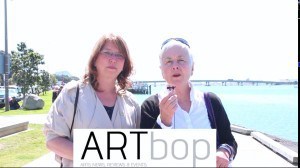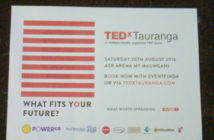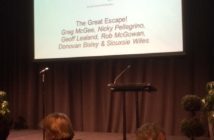There is an increasing acknowledgement of the importance of “writing” within the Tauranga creative community. Tauranga Writers is an established self-help group and one of its members, ARTbop contributor, Diane Hume-Green was a volunteer in the Crystal Palace pop-up venue during the 2015 Tauranga Arts Festival. Diane shares some of her observations of the comprehensive 2015 Readers & Writers programme.
As part of the Tauranga Arts Festival 2015 the Readers and Writers Festival sessions were held over two weekends at the Pacific Crystal Palace located in Masonic Park.
In Their Element – Riley Elliott The author of Shark Man was passionate about sharks and how worldwide shark population decline impacts on the cycle of sea life. Studying in South Africa proved challenging as he had to learn to swim in the same waters as the great white sharks and related several hair–raising incidents during his time there. The origins and practice of taking shark fins for shark fin soup was also explained by Riley and why it needs to be banned, as NZ was the largest exporter of shark fins. He has hosted a tv series of the same name as his book, highlighting his mission to save these feared predators and to inform us of their value.
Farewell Kabul – Christina LambWallace Chapman interviewed Christina Lamb about her time in Afghanistan during one of the longest wars the UK has been involved in. She has been reporting on that region for over 25 years. She is one very plucky woman and she recounted the dangerous situations she has been in including being ambushed by the Taleban. Her insights into life and politics in Afghanistan was fascinating and she also travelled with Benazir Bhutto’s procession the day of her assassination in Pakistan. She outlined the decision by Britain to be involved in the Afghanistan war and also their decision to retreat from the area. Her views on the present day refugee crisis were touched on and also featured in her later talk with Tracey Barnett.
Silver Surfer – Phil Jarrett Legendary surfer and journalist, Phil Jarrett, gave a great talk about his love of surfing and writing about that lifestyle. A subject familiar to many in New Zealand but not so his experience of working for Quiksilver in California. The Australian company started by surfing enthusiasts who designed clothing and equipment for their surfing lifestyle soon turned into a multi-million dollar company. His book, Salts and Suits outlines the challenge the owners faced when they listed the company and had to hire guys with university degrees to help run the company. Infighting and the global financial crisis nearly derailed the iconic company. He also related stories of Hawaiian surfer, Duke Kahanamoku’s surfing adventures in Australia and New Zealand. Duke was the subject of his book, That Summer at Boomerang. When I spoke to him and his wife after the event, he talked about the Noosa Surfing Festival that he started many years ago and how he was leaving the next week to go to speak at a Writers Festival in Bali. He has lived in Bali previously and has also written a book about the idyllic looking island’s violent history, Bali – Heaven and Hell.
Displaced – Christina Lamb and Tracey Barnett Christina and Tracey debunked much of the information we have been given about the refugee crisis affecting many thousands of people who are desperate to get to Europe, escaping war in Syria, Africa and other countries. Christina said social media, especially cellphones, is making information sharing very simple to let people know the best times and places to cross the sea or which borders are more accessible. Many of the refugees are skilled workers who are needed in their own countries to provide essential services. As it costs money to leave these countries it is usually middle class people who can pay to leave.
Tracey Barnett who is also a journalist and originally from America, promoted the Facebook page Wage Peace NZ which urges the government to increase the refugee quota. In comparison to other countries our quota is very low. We have resettlement centres in Auckland, Wellington, Hamilton and Nelson but we choose our refugees. She highlighted the issue of Australia paying other countries such as Nauru and Cambodia to take refugees. Christina and Tracey both talked about how some countries have cities that have a multi-cultural population but other parts of the same country may have strong religious or racial views against refugees. The European problem is overwhelming with no quick answer and some countries such as Sweden are rethinking their open borders.
Family Ties Mandy Hagar and Nicky Hagar were interviewed by Toby Manhire. It was a really interesting talk by the brother and sister, both authors, about their life growing up with parents who emigrated to New Zealand, and growing up in small town Levin. With parents who took on social causes they were used to having other people visiting or living in their house, such as unmarried mothers and gay couples at a time when society frowned upon these people’s lifestyle choices. Their home was an architecturally designed open plan house with a large section which their mother landscaped and it also had stands of native bush. They were a close-knit family with four children who had no cousins, aunts, uncles or grandparents in New Zealand. Their parents had both had disrupted lives with their father escaping from Europe and their mother an ex colonial from Zanzibar.
Mandy described Nicky as incisive and intellectual and someone who could always give her a clear, well-balanced answer to any of her questions even when they were at College. Mandy thought she was more outwardly conservative as a reaction to being labelled ‘weird’ or ‘strange’ by her peer group.
Nicky said he enjoys talking to groups of journalism students but feels the older journalist fraternity take him to task as they do not have the freedom he has to investigate his subjects. He likes to get away from the stress by tramping in the bush and swimming. He has to keep his writing under wraps by only working with a couple of people he trusts such as his editor and publisher. He did admit that the timing with the release of his book, Dirty Politics, just before the election, was not the best and he was also not prepared for the backlash that followed. He did add however that he likes to see the fundamental goodness in people.
Art in the Right Places Mandy Hagar was interviewed by Penelope Jackson Mandy talked about her Young Adult novel writing and living in the South of France as winner of the Katherine Mansfield Fellowship award in 2014. She travelled a lot around Europe when she was there and said she always makes notes when travelling. She said she was surrounded by the wealth of Monaco on one side and the refugees at the Italian border on the other. Visiting Vienna to meet relatives she had never met before was emotional. She was upset when she saw the culture and history there that her father had left. But after a week she realised he was the lucky one to not have the restrictions of that kind of life but the freedom in New Zealand instead.
Mandy also talked about her method of writing and that she also tutors a year-long course on novel writing, one weekend per month. Her book, Dear Vincent, a story of a girl coming to terms with her sister’s suicide and bleak family life, has been well received by young people but schools were wary of talking about the subject of suicide. She read a letter from a girl in Australia who had also used art to escape from depression and self- harm and had read the book whenever she felt vulnerable.
Mandy said she asks herself the question when she writes a book, ‘What would be the outcome of this book to make it a success? To her it is when someone is touched by her writing.
She does use swear words as emphasis in her books and one of her books had them tallied up into categories which she found amusing. She writes in a structured manner from 8am until the afternoon and it usually takes 7-8 months for her to write a novel. She edits the day’s printed pages during the evening.
Her new novel was researched during her time in Europe. It is set in the 12th century and is about a French woman, Heloise d’Argenteuil and her affair with an older man, Peter Abelard. This two-year affair became a scandal which led to her becoming a nun. Mandy is writing the book from Heloise’s point of view as she spent 42 years in a convent but was one of the most well-educated women in France. She had intelligence but a constricted life.
Mandy Hagar’s books have such diverse topics and the research she does obviously shows in the attention to detail in her work.
The Great War Dr Damien Fenton and Harry Ricketts in discussion (chaired by Toby Manhire) Tauranga born historian Dr Damien Fenton is writing a new book about the Ottoman Turks and their role in many wars. His discussion with Harry Ricketts and chair, Toby Manhire, mainly centred on the First World War and the Gallipoli campaign. The poetry written during the war was the subject of a book, Strange Meetings, by Harry Ricketts. Damien Fenton co-authored the book, New Zealand and the First World War and a second book, The Anzacs. They talked about how Gallipoli had almost become a mythological place and some facts have been overlooked or changed from the real story. New Zealand and Australia celebrate Anzac Day differently according to Damien Fenton, who lived in Canberra for 10 years, where he said he had seen many parades where crowds clapped and cheered. In New Zealand it is more sombre. The same effect on young people from both countries though is that a trip to Anzac Cove has become part of the OE experience.
The discussion about the start and course of World War 1 was every interesting and an easily digestible history lesson. Some of the poetry written during this war had a resurgence during the Vietnam War and Benjamin Brittain’s famous War Requiem used parts of nine poems in it. The interest in World War 1 was also started in the UK in 2014 by the BBC documentary, The Great War, which was first broadcast in 1964. A musical first performed in 1969, O What a Lovely War, had a new production in 2014 which was also part of this swell of interest in World War 1 and the centenary commemorations of the war. In New Zealand, The Great War exhibition created by Sir Peter Jackson, is on display at Te Papa.
 Diane Hume-Green: Writer Diane Hume-Green is regular contributor to ARTbop through her column Scene about Town, She is also a lead interviewer/conversationalist on The ARTbopSHOW. Diane is a member of Tauranga Writers and the local TedX organising group. She is the eldest daughter of an established Tauranga music, business and creative family. Diane recounts family stories of her attendance at Tauranga Jazz Club events in her carrycot. With her background in fabric, fashion, interior and architectural design, her continuing participation in a broad spectrum of arts and creativity and her attendance at a wide range of performance, social and community activities, Diane’s contributions are an interesting and readable insight into current Tauranga. (Photo: Diane Hume-Green and ARTbop Managing Editor on the Tauranga Waterfront October 2015 promoting the Tauranga Arts Festival 2015. Photographer Dhaivat Mehta, Editor ARTbop alternative and Director The ARTbopSHOW)
Diane Hume-Green: Writer Diane Hume-Green is regular contributor to ARTbop through her column Scene about Town, She is also a lead interviewer/conversationalist on The ARTbopSHOW. Diane is a member of Tauranga Writers and the local TedX organising group. She is the eldest daughter of an established Tauranga music, business and creative family. Diane recounts family stories of her attendance at Tauranga Jazz Club events in her carrycot. With her background in fabric, fashion, interior and architectural design, her continuing participation in a broad spectrum of arts and creativity and her attendance at a wide range of performance, social and community activities, Diane’s contributions are an interesting and readable insight into current Tauranga. (Photo: Diane Hume-Green and ARTbop Managing Editor on the Tauranga Waterfront October 2015 promoting the Tauranga Arts Festival 2015. Photographer Dhaivat Mehta, Editor ARTbop alternative and Director The ARTbopSHOW)



